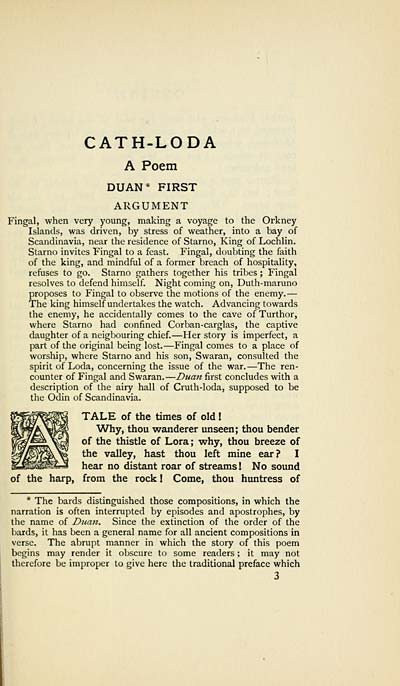Ossian Collection > Poems of Ossian
(31)
Download files
Complete book:
Individual page:
Thumbnail gallery: Grid view | List view

CATH-LODA
A Poem
DUAN* FIRST
ARGUMENT
Fingal, when very young, making a voyage to the Orkney
Islands, was driven, by stress of weather, into a bay of
Scandinavia, near the residence of Starno, King of LochHn.
Starno invites Fingal to a feast. Fingal, doubting the faith
of the king, and mindful of a former breach of hospitality,
refuses to go. Starno gathers together his tribes ; P'ingal
resolves to defend himself. Night coming on, Duth-maruno
proposes to Fingal to observe the motions of the enemy. —
The king himself undertakes the watch. Advancing towards
the enemy, he accidentally comes to the cave of Turthor,
where Starno had confined Corban-carglas, the captive
daughter of a neigbouring chief. — Her story is imperfect, a
part of the original being lost. — Fingal comes to a place of
worship, where Starno and his son, Swaran, consulted the
spirit of Loda, concerning the issue of the war. — The ren-
counter of Fingal and Swaran. — Duan first concludes with a
description of the airy hall of Cruth-Ioda, supposed to be
the Odin of Scandinavia.
TALE of the times of old I
Why, thou wanderer unseen; thou bender
of the thistle of Lora ; why, thou breeze of
the valley, hast thou left mine ear? I
hear no distant roar of streams 1 No sound
of the harp, from the rock ! Come, thou huntress of
* The bards distinguished those compositions, in which the
narration is often interrupted by episodes and apostrophes, by
the name of Duan. Since the extinction of the order of the
bards, it has been a general name for all ancient compositions in
verse. The abrupt manner in which the story of this poem
begins may render it obscure to some readers ; it may not
therefore be improper to give here the traditional preface which
3
A Poem
DUAN* FIRST
ARGUMENT
Fingal, when very young, making a voyage to the Orkney
Islands, was driven, by stress of weather, into a bay of
Scandinavia, near the residence of Starno, King of LochHn.
Starno invites Fingal to a feast. Fingal, doubting the faith
of the king, and mindful of a former breach of hospitality,
refuses to go. Starno gathers together his tribes ; P'ingal
resolves to defend himself. Night coming on, Duth-maruno
proposes to Fingal to observe the motions of the enemy. —
The king himself undertakes the watch. Advancing towards
the enemy, he accidentally comes to the cave of Turthor,
where Starno had confined Corban-carglas, the captive
daughter of a neigbouring chief. — Her story is imperfect, a
part of the original being lost. — Fingal comes to a place of
worship, where Starno and his son, Swaran, consulted the
spirit of Loda, concerning the issue of the war. — The ren-
counter of Fingal and Swaran. — Duan first concludes with a
description of the airy hall of Cruth-Ioda, supposed to be
the Odin of Scandinavia.
TALE of the times of old I
Why, thou wanderer unseen; thou bender
of the thistle of Lora ; why, thou breeze of
the valley, hast thou left mine ear? I
hear no distant roar of streams 1 No sound
of the harp, from the rock ! Come, thou huntress of
* The bards distinguished those compositions, in which the
narration is often interrupted by episodes and apostrophes, by
the name of Duan. Since the extinction of the order of the
bards, it has been a general name for all ancient compositions in
verse. The abrupt manner in which the story of this poem
begins may render it obscure to some readers ; it may not
therefore be improper to give here the traditional preface which
3
Set display mode to: Large image | Transcription
Images and transcriptions on this page, including medium image downloads, may be used under the Creative Commons Attribution 4.0 International Licence unless otherwise stated. ![]()
| Early Gaelic Book Collections > Ossian Collection > Poems of Ossian > (31) |
|---|
| Permanent URL | https://digital.nls.uk/82630883 |
|---|
| Description | Selected books from the Ossian Collection of 327 volumes, originally assembled by J. Norman Methven of Perth. Different editions and translations of James MacPherson's epic poem 'Ossian', some with a map of the 'Kingdom of Connor'. Also secondary material relating to Ossianic poetry and the Ossian controversy. |
|---|
| Description | Selected items from five 'Special and Named Printed Collections'. Includes books in Gaelic and other Celtic languages, works about the Gaels, their languages, literature, culture and history. |
|---|

